

An adult with a job will experience the pressure of work-related stress at one point of their life such as the pressure to meet the deadline of a project or being tasked a leadership role in a project. However, when this work stress becomes severe, it can be harmful to both physical and emotional health.
Despite the negative connotation associated with stress, stress can be seen as a positive drive for someone to succeed in their life. Here, we will discuss some of the ways in which working adults can manage their stress.
Stress. Daily Life - The American Institute of Stress. 2014 Stress Statistics General Stress Response Hans Selye defined stress as the body’s nonspecific response to any demand, whether it is caused by or results in pleasant or unpleasant stimuli.
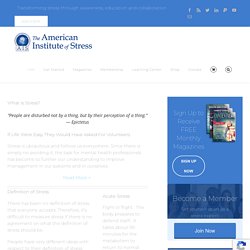
It is essential to differentiate between the unpleasant or harmful variety of stress termed distress, which often connotes disease, and eustress, which often connotes euphoria. During both eustress and distress, the body undergoes virtually the same non-specific responses to the various positive or negative stimuli acting upon it. However, eustress causes much less damage than distress.
There are three components to the General Stress Syndrome. Stress diseases are maladies caused principally by errors in the body’s general adaptation process. Bodily Reaction to Stress as illustrated in Zimbardo, Johnson, & McCann (2017) Why it is important to know this? Stress: Why does it happen and how can we manage it? Stress is a natural feeling of not being able to cope with specific demands and events.
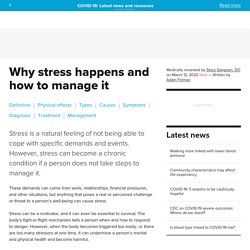
However, stress can become a chronic condition if a person does not take steps to manage it. These demands can come from work, relationships, financial pressures, and other situations, but anything that poses a real or perceived challenge or threat to a person’s well-being can cause stress. Stress can be a motivator, and it can even be essential to survival. The body’s fight-or-flight mechanism tells a person when and how to respond to danger. However, when the body becomes triggered too easily, or there are too many stressors at one time, it can undermine a person’s mental and physical health and become harmful. Stress is the body’s natural defense against predators and danger. When humans face a challenge or threat, they have a partly physical response. The body produces larger quantities of the chemicals cortisol, epinephrine, and norepinephrine.
Cause of Stress. A whopping 92% of working Singaporeans are stressed – and women are prioritising families over themselves, study finds, Business Insider - Business Insider Singapore. Pexels If you’re feeling stressed at work, you’re not alone.
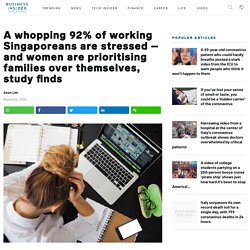
A vast majority of working Singaporeans are under stress, and women in particular feel that it’s less manageable, a survey has found. In the 2019 Cigna 360 Well-Being Survey, a whopping 92 per cent of working Singaporeans report feeling stressed, higher than the global average of 84 per cent. Of this, 13 per cent say their stress is unmanageable, which is on par with the global average, according to the study which surveyed a total of 13,200 online interviews in 23 markets, including 502 residents in Singapore.
And stress doesn’t go undetected in the workplace. Read also: 6 in 10 Singaporeans admit that they don’t leave work on time just to ‘show face’ TODAYonline. SINGAPORE — Singaporeans are not only sleep deprived, but they are also among the most stressed at work globally, according to a survey by health service company Cigna released on Tuesday (Mar 26).

Nearly 92 per cent of Singaporeans surveyed were stressed from work, which was higher than the global average of 84 per cent. Of this group, 13 per cent said that the stress they faced was unmanageable. Singaporeans’ physical wellness index also dipped by 4.4 percentage points from last year, which the survey attributed to an increase in sleepless nights. Stress at the workplace. Common Source of Stress at work. Burn-out an "occupational phenomenon": International Classification of Diseases.
TODAYonline. SINGAPORE — Miss Wee Sihui is only 22, but the former retail assistant, who started working full-time early this year, is suffering burnout from work and its accompanying symptoms of feeling constant exhaustion, negativity, dread and pessimism.

She used to work in a popular confectionery store and when there was a manpower crunch, she spent around 13 hours on her feet from 9.30am to around 10.30pm daily, juggling responsibilities meant for at least two employees. But it wasn’t just the physically punishing work routine that made her quit her job. The mental stress, fuelled by a lack of support at work, led to anxiety attacks. “I sometimes felt like I could not breathe. I had trouble handling the stress of multi-tasking tasks while looking after the store alone,” she said. “I didn’t tell my managers as I didn’t want to seem like a ‘complain queen’. The final straw came when Ms Wee came down with a bad case of flu in June. She quit her job recently to take a breather. Coping one day and crying the next: Work-related burnout is real. SINGAPORE: One day at work, Ms Jamuna Raj was striking off “to-dos” from a neat hand-written list, thinking she had a lid on all her tasks at work.
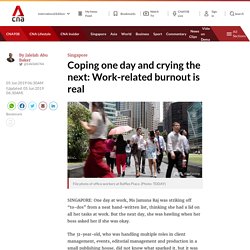
But the next day, she was bawling when her boss asked her if she was okay. The 31-year-old, who was handling multiple roles in client management, events, editorial management and production in a small publishing house, did not know what sparked it, but it was the start of her journey towards realising that she was experiencing burnout. “I was striking the to-dos off, but for every one that I did, there were five more. Singapore spends $3.1 billion on stress-related illnesses annually: Study, Health News. SINGAPORE - A study has found that Singapore spends about US$2.3 billion (S$3.1 billion), or 18 per cent, of its total healthcare expenditure on stress-related illnesses annually.
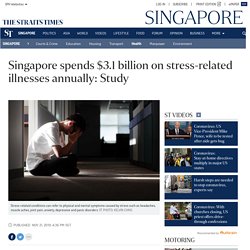
This put the nation's proportion of expenditure on stress-related illnesses second-highest out of the nine regions studied in the report, coming just 0.8 per cent behind Australia's 18.8 per cent. The other seven regions were Hong Kong, South Korea, Taiwan, Thailand, United Arab Emirates, the United Kingdom and the United States. The report, which was produced by healthcare consultancy firm Asia Care Group on behalf of health insurance and services company Cigna, was published on Thursday (Nov 21). Globally, 84 per cent of people surveyed in past studies admitted to feeling stressed, said Cigna's regional chief executive officer Julian Mengual, while 64 per cent reported that they operated in an "always on" environment. Healthxchange. Long-term exposure to work stress can lead to occupational burnout.
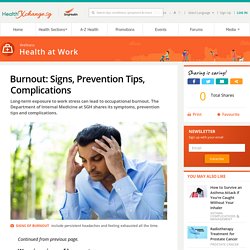
The Department of Internal Medicine at SGH shares its symptoms, prevention tips and complications. Continued from previous page. Warning signs of burnout Watch out for warning signs that you are experiencing too much stress. Are you having trouble sleeping or eating? The Sandwich Generation. Rising Financial Burdens for Middle-Aged Americans By Kim Parker and Eileen Patten With an aging population and a generation of young adults struggling to achieve financial independence, the burdens and responsibilities of middle-aged Americans are increasing.
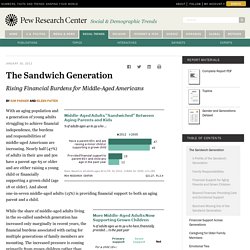
Nearly half (47%) of adults in their 40s and 50s have a parent age 65 or older and are either raising a young child or financially supporting a grown child (age 18 or older). And about one-in-seven middle-aged adults (15%) is providing financial support to both an aging parent and a child. While the share of middle-aged adults living in the so-called sandwich generation has increased only marginally in recent years, the financial burdens associated with caring for multiple generations of family members are mounting. Looking just at adults in their 40s and 50s who have at least one child age 18 or older, fully 73% have provided at least some financial help in the past year to at least one such child. Result from the Pew Research Centre: Rising Financial Burdens for Middle-Aged Americans. When Stress Is Actually Good for You - The American Institute of Stress. We rarely hear people say, “I’m really feeling stressed.
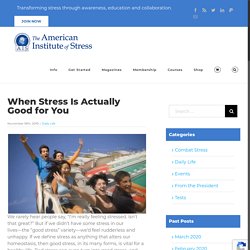
Isn’t that great?” But if we didn’t have some stress in our lives—the “good stress” variety—we’d feel rudderless and unhappy. Why Eustress Is Your Friend. Not all stress is the same. Some of the stress that we face in life can be more detrimental to our well-being, and some types of stress can actually be healthy for us. For example, chronic stress—the type of stress that seems to be constant and psychologically or emotionally draining—is the most harmful to our health and wellbeing.1 This kind of chronic stress can trigger the stress response and keep it triggered for long periods of time, leaving us exhausted and close to burnout. Why Eustress Is Good Stress Eustress, on the other hand, can be beneficial and is actually necessary for our overall wellbeing. This is the type of "positive" stress that keeps us vital and excited about life.2. What is Eustress and How Is It Different than Stress? [2019 Upd.] In this article, we will explore the way in which eustress – what I call positive stress – may provide a long-lasting solution to the pervasive “distress” which may be creating harm in our lives.
“Imagine feeling capable of handling whatever life throws at you, without having to panic, overreact, or plan your exit strategy.” Kelly McGonigal (2008) is a health nutritionist and professor at Stanford University and believes this is possible. By delving into the inner-workings of stress, we can develop an understanding of how eustress may enable us to live more fulfilling, meaningful lives unconstrained by disproportionate neurological responses. What is the Meaning of Eustress?
Let’s start by looking at stress. Coping with stress at work. Everyone who has ever held a job has, at some point, felt the pressure of work-related stress. Any job can have stressful elements, even if you love what you do. In the short-term, you may experience pressure to meet a deadline or to fulfill a challenging obligation. Stress Management.
While it may seem like there’s nothing you can do about stress at work and home, there are steps you can take to relieve the pressure and regain control. Why is it so important to manage stress? If you’re living with high levels of stress, you’re putting your entire well-being at risk. Stress wreaks havoc on your emotional equilibrium, as well as your physical health. It narrows your ability to think clearly, function effectively, and enjoy life. Coping with Stress. The most dangerous aspect of stress is how easily it can creep up on you. You think that you got used to it. It may start to feel familiar, or even normal. You may not notice how much it is affecting you, even as it exacts a heavy toll. If you often feel frazzled and overwhelmed, it is time to take action to bring your emotional and physical health back on track.
Key Take Aways: 3A's of Effective Stress Management. What is mindfulness? - Brahm Centre. Have you been feeling stressed / anxious / depressed / angry? Are you having trouble sleeping well? Do you feel dissatisfied with your quality of life? Mindfulness can help you enjoy the happier and healthier life you want! Keep calm and join a mindfulness workshop, Lifestyle News. A group of mothers are seated on the floor in a circle, some with babies on their laps.
They may sit in silence, focusing on their breathing. 13 Affordable Yoga Studios in Singapore With Classes Under $20 Each. Photo: Yoga Movement If the financial commitment of unlimited class packages or monthly gym membership is holding you back from taking the first step to learning yoga, turn to these wallet-friendly alternatives instead. These boutique yoga studios offer 20- to 30- class packages that work out to be $20 or less for each session. All that money you save can then be channelled to expanding your activewear collection! Yoga Inc. Stress Symptom Checklist. Important. Overcoming Stress.